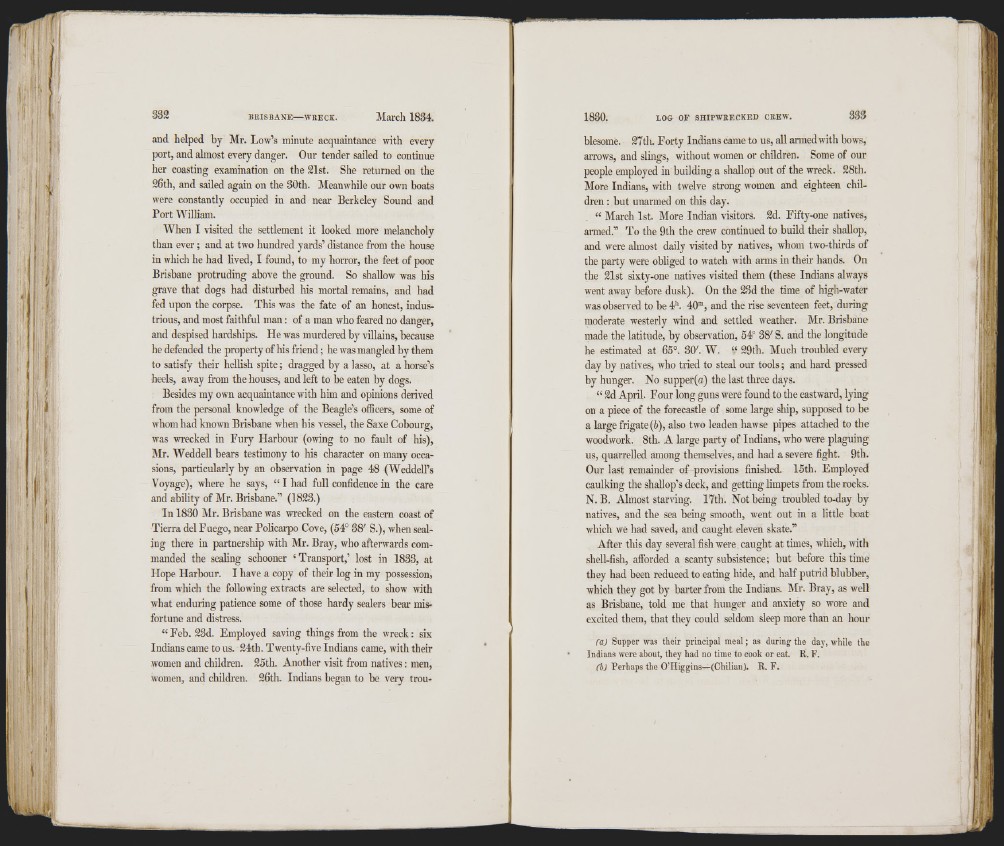
! I
!
7 '
JM
r |
" I
ii
\
and helped by Mr. Low’s minute acquaintance with every
port, and almost every danger. Our tender sailed to continue
her coasting examination on the 21st. She returned on the
26th, and sailed again on the 30th. Meanwhile our own boats
were constantly occupied in and near Berkeley Sound and
Port William.
When I visited the settlement it looked more melancholy
than ever; and at two hundred yards’ distance from the house
in which he had lived, I found, to my horror, the feet of poor
Brisbane protruding above the ground. So shallow was his
grave that dogs had disturbed his mortal remains, and had
fed upon the corpse. This was the fate of an honest, industrious,
and most faithful man: of a man who feared no danger,
and despised hardships. He was murdered by villains, because
he defended the property of his friend; he was mangled by them
to satisfy their hellish spite; dragged by a lasso, at a horse’s
heels, away from the houses, and left to be eaten by dogs.
Besides my own acquaintance with him and opinions derived
from the personal knowledge of the Beagle’s officers, some of
whom had known Brisbane when his vessel, the Saxe Cobourg,
was wrecked in Fury Harbour (owing to no fault of his),
Mr. WeddeU beai-s testimony to his character on many occasions,
particularly by an observation in page 48 (Weddell’s
Voyage), where he says, “ I had full confidence in the care
and ability of Mr. Brisbane.” (1823.)
In 1830 Mr. Brisbane was wrecked on the eastern coast of
Tierra del Fuego, near Policarpo Cove, (54° 38' S.), when sealing
there in partnership with Mr. Bray, who afterwards commanded
the sealing schooner ‘Transport,’ lost in 1833, at
Hope Harhour. I have a copy of their log in my possession,
from which the following extracts are selected, to show with
what enduring patience some of those hardy sealers bear misfortune
and distress.
“ Feb. 23d. Lmployed saving things from the wreck: six
Indians came to us. 24th. Twenty-five Indians came, with their
women and children. 25th. Another visit from natives: men,
women, and children. 26th. Indians began to be very troublesome.
27tli. Forty Indians came to us, all armed with bows,
arrows, and slings, without women or children. Some of our
people employed in building a shallop out of the wreck. 28th.
More Indians, with twelve strong women and eighteen children
: but unarmed on this day.
“ March 1st. More Indian visitors. 2d. Fifty-one natives,
armed.” To the 9th the crew continued to build their shallop,
and were almost daily visited by natives, whom two-thirds of
the party were obliged to watch with arms in their hands. On
the 21st sixty-one natives visited them (these Indians always
went away before dusk). On the 23d the time of high-water
was observed to he 4''. 40“ , and the rise seventeen feet, during
moderate westerly wind and settled weather. Mr. Brisbane
made the latitude, by observation, 54° 38' S. and the longitude
he estimated at 65°. 30'. W. “ 29th. Much troubled every
day by natives, who tried to steal our tools; and hard pressed
by hunger. No supper(fi) the last three days.
“ 2d April. Four long guns were found to the eastward, lying
on a piece of the forecastle of some large sliip, supposed to be
a large frigate(6), also two leaden hawse pipes attached to the
woodwork. 8th. A lai-ge party of Indians, who were plaguing
us, quarrelled among themselves, and had a severe fight. 9th.
Our last remainder of provisions finished. 15th. Lmployed
caulking the shallop’s deck, and getting limpets from the rocks.
N. B. Almost starving. 17th. Not heing troubled to-day by
natives, and the sea being smooth, went out in a little boat
which we had saved, and caught eleven skate.”
After this day several fish were caught at times, which, with
shell-fish, afforded a scanty subsistence; hut before this time
they had been reduced to eating hide, mid half putrid blubber,
which they got by barter from the Indians. Mr. Bray, as well
as Brisbane, told me that hunger and anxiety so wore and
excited them, that they could seldom sleep more than an hour
(a) Supper was tlieir principal meal; as during the day, while the
Indians were about, they had no time to cook or eat. R. F.
(h) Perhaps the OTliggins—(Chilian). R. F.
1 *1
lì